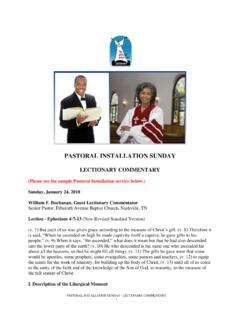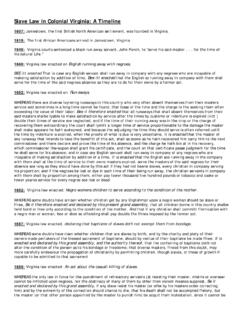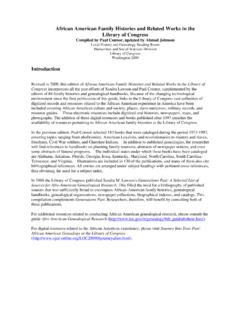Transcription of The Biblical Foundations of Leadership - Divinity School
1 The Biblical Foundations of LeadershipBy Dr. Forrest E. Harris, Sr. President, american Baptist College Director, Kelly Miller Smith Institute on the Black church Vanderbilt University Divinity School Nashville, Tennessee Biblically and theologically, what can be said about the black church can also be said about the vision of its religious Leadership . The black community s most effective leaders have been nurtured in the "cultural and spiritual womb" of the black church s Biblical faith (The Black church in the african american Experience, Lincoln and Mamiya, p.)
2 8). Historically, Biblical models of Leadership informs the Leadership vision and efforts of the black church to bring about spiritual transformation, social change and justice in the community. Abraham, Moses, Saul, David, Nehemiah, the Hebrew prophets, and Jesus are Biblical models of Leadership from which the black church has drawn its inspiration and commitment to the dream of God. Biblical paradigms of Leadership suggest that religious Leadership is a response to a divine call to be in the service of God s love and justice. This Biblical paradigm reveals a theology of Leadership which focuses on a pattern of God calling leaders to one mission enterprise - to be in the service and restoration of God s image in everyone and in everything.
3 Verna Dozier calls this mission of restoration "the Dream of God" (The Dream of God, Dozier, 1991). The ancient Hebrew community and first century Christians have vital lessons to teach us about the nature of religious Leadership . Let s briefly explore models of Leadership from the Bible. Abraham The story of Abraham represents the earliest record of Leadership in the Bible. Abraham s Leadership begins with an act of faith. Abraham is grasp by divine destiny to begin a journey of faith to an alternative future, a future which will bless all families of the earth.
4 We learn from the experience of Abraham that Leadership on the high plane of faith involves risk. Leadership response to faith is not an intellectual assent to a proposition, it is risking that the purpose to which God calls us is worthy of trust and service. Without deposits of faith, Leadership in response to God s call proves impossible. Fear and faith will challenge religious leaders. Fear prompted Abraham to deceive the Egyptians regarding his wife. Leadership is a faith venture. Leaders must be aware that the aims, goals, challenges of Leadership may cheat and deceive them but if leaders run away from them they shall find themselves bumping into over and over again.
5 Abraham was a good steward of God s dream. Throughout the centuries of Christian theological development, Abraham stands, as a pivotal symbol of Leadership that is both faithful and fruitful Much of New Testament theology is an interpretation of the meaning of Abraham s faith and Leadership . "And Abraham believed God, it was credited to him as righteousness" (Romans 4:3b NIV) rewards Abraham s faith, and initiates -an alternative community around Abraham s model of Leadership . Moses The Bible assigns a high status to visionary leaders who with courage offer themselves as agents of God s mission.
6 In the case of Moses, God s mission was liberation. Moses grew up in Pharaoh s household as an Egyptian prince with a Hebrew memory. Moses had a significant religious experience on Mt. Horeb that sanctified him as -a leader of God s people from slavery to freedom. In the burning-bush story a situation of exploitation and injustice already exists, and God tells Moses that God is taking sides with oppressed Hebrews against the Egyptian establishment. The burning bush contract introduces a revolutionary quality into the Leadership model Moses represents.
7 At its theological core, Biblical Leadership is revolutionary. Through Moses Leadership , a new social community emerged to match the vision of God s freedom. God called Moses to Leadership as a liberator with prophetic and redemptive hope for the children of Israel. Leadership proves difficult for Moses in the new alternative community. Moses was often frustrated. Idolatry and corrupt vision of God s purpose presented formidable barriers to the Leadership Moses sought to offer. The Egyptian culture and consciousness remained with the people while they made slow progress to the Promised Land.
8 History has found few leaders suited for the demands of liberation, who are equipped to lead people in transformation of identity, culture and consciousness. Moses paid a great price for the Leadership he sought to give the Hebrew community. Hebrew Leadership is difficult; it cost Moses denial of life in the Promised Land. Through the revelation of God, Moses received the Ten Commandments and made them the ethical and theological mandate of the Hebrew community. One of the burden of religious Leadership is consistent ethical and theological guidance.
9 Religious leaders must consider themselves resident theologians to ensure that the ministry, mission and life of the faith community they serve is biblically based and theologically sound. The Leadership of Moses is symbolic; it extends over the past, present, and future into the religious experience of the Black church . The Negro Spiritual - Go down, Moses, Way down in Egypt land, Tell old Pharaoh To let my people go. captures the theological understanding of the kind of Leadership the Black church has cultivated in its socio-political struggles for human dignity, freedom and salvation.
10 Saul Saul, the first king of Israel was a tragic figure whose Leadership collapsed in failure because of jealously and insecurity. Saul s Leadership emerged in a transitional period between the end of an old order of tribal Leadership through the Judges and the birth of a new order of Leadership , Israel under the monarchy of kings. Transitional Leadership is difficult, particularly when insecurities block vision and there is little facility for achieving right perspective of self-contradictions and ambiguities. Leaders need an other-than-self-reference if they are to led in times of transition and social crisis.









